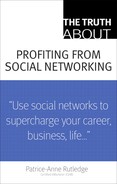Digital dirt. By now, you know that this term refers to negative information about you that’s found on the Internet, including social networking sites. You may even have some of your own digital dirt to contend with, such as
Profiles on social networking sites that contain unprofessional content
Unprofessional website and blog content, both content on your own sites as well as comments you leave on other sites
Inappropriate photos or videos
Contradictory information (what you tell an employer doesn’t match your LinkedIn profile, for example)
Negative news stories about you or your company
Critical comments others make about you online
Comments or reviews you post online, such as on blogs or sites like Amazon.com
Social networking and other forms of participation on the web make your past an open book. Some of the information about you is positive and can benefit you, such as news about your professional achievements, articles you’ve written, and so forth. Other information is neutral, such as most content that relates to hobbies and personal interests. And then there’s the digital dirt.
If there’s dirt about you online, it’s obvious that you need to clean it up before it becomes an issue during a job search or other professional situation. The same goes for anything that doesn’t really fall under the digital dirt category but is something you would rather not have others read about you online.
Run your own Google check on your name to see what’s out there. Review your profile on every social networking site you’ve ever used. If there’s something you don’t like, remove it. But, of course, it isn’t always that simple. For example, it’s unlikely that you can delete a news story that mentions you unless the information is clearly false. You might also have trouble deleting content or commentary on sites that you don’t control. Usually a polite request to the site owner results in the deletion of the content in question, but not always. In these cases, honesty is the best policy. If a prospective employer or client brings up this information, be prepared with a response that puts the situation in the best light possible. Another potential situation is having the same name as someone whose reputation isn’t as stellar as yours. To differentiate yourself from this person, consider using a middle initial or some other variation of your name.
Also keep in mind that, although about half of all employers do search the Internet for information about prospective employees, the other half do not. The same most likely holds true for people interested in doing business with you. It doesn’t pay to stress about something that you can’t change. Instead, focus on adding more positive content about you online that appears higher in your search engine rankings.
Just because you know that there are no questionable photos or unflattering content about you on the Internet right now doesn’t mean that you can take it easy, however. Even if you don’t post anything yourself, new content about you could pop up online at any time, particularly if you’re active in your profession or community. To keep track of what’s being said about you or your business on the web, sign up for an alert service. Both Google Alerts (www.google.com/alerts) and Yahoo! Alerts (www.yahoo.com/alerts) will send you an email notification any time a new mention of your name appears on the web—on a website or blog, on a publicly available social networking site page, or in a news story. You can be notified on a daily basis or get regular roundups at a specific interval. If you’re monitoring the online reputation of a larger company, however, you may be better off signing up with one of the many online reputation management services now available.
Sometimes it’s the lesser dirt, or content you don’t even think of as unflattering, that can cause problems. The issue is perspective. In other words, not everyone agrees on what constitutes “negative” information online. Sure, most people feel that uncovering provocative photos or stories about your arrest record would be a cause for concern in the business world, but other areas are more nebulous. What about information concerning your political opinions, lifestyle choices, religious beliefs, health conditions, volunteer activities, or even hobbies? Could certain individuals also construe this information as “negative?” For example
A recruiter finds information about your handmade jewelry business on MySpace and thinks you may be too busy with your sideline vocation to take on the top job you’re interviewing for.
A hiring manager who’s an atheist is dismayed to find out that you’re active on a Christian social networking site.
A business partner comes across a fundraising badge on your Facebook page and is outraged that you support this cause.
Your new boss reads your profile on the Mothers of Many social networking site and fears that, as a mother of six children, you might not be the right choice for the upcoming promotion at work.
Most people are able to remain objective in a business setting, but biases do creep into professional decisions from time to time. The question you need to ask is this: How much do you want to censor yourself online? It’s one thing to clean up truly unflattering or unprofessional information, but do you really want to hide everything that could possibly irritate even one person? Where do you draw the line?
Other than the small amount of online information about you that you can’t delete or change, for the most part, you’re in control of what you reveal about yourself online. Developing and protecting your online image is something that every social networker needs to consider. In the end, how much of an “open book” you want to be online is up to you.
